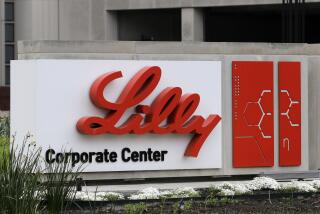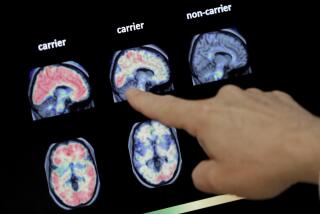SCIENCE / ANTIBIOTICS : Old Failures Give New Life to Battle Against Brain Disorders
- Share via
A family of potential antibiotics that were discarded a decade ago because they were not effective enough at killing bacteria may have new uses as possible treatments for Alzheimer’s disease, Parkinson’s disease and strokes, a USC researcher said Wednesday.
The drugs are only being tested in rodents, however, and neurologist Franz Hefti cautioned that tests of the drugs in humans are still five to 10 years away.
Nonetheless, researchers and pharmaceutical companies are excited about the chemicals because they may enable neuroscientists to bypass a major obstacle to the use of the naturally occurring brain hormones called nerve growth factors.
These growth factors have shown promise for treating Alzheimer’s disease and other disorders in limited tests in humans. But they can only be administered by injecting them through a hole drilled in the skull. If they are given orally or by standard injection, they do not pass through the blood-brain barrier that protects the brain from harmful substances in the blood.
The antibiotics, however, are simple chemicals that pass readily through the blood-brain barrier. And once in the brain, laboratory tests suggest, they stimulate the activity of nerve growth factors that are naturally present.
“We’ve been waiting 10 years for this and now we will be able to do the things we have been dreaming of,” Hefti said.
The discovery of the chemicals’ effects on brain cells is a significant development that is being pursued by several U.S. pharmaceutical companies, said neuroscientist Gordon Guroff of the National Institutes of Health in Bethesda, Md.
Drugs based on the chemicals could be highly profitable because millions of Americans suffer from debilitating brain disorders--about 4 million suffer from Alzheimer’s disease.
The chemicals are “very, very important,” said Nicole Vitullo, a spokeswoman for Cephalon of West Chester, Pa., one of the companies studying their use. Until now, she said, most companies have concentrated on using the nerve growth factors to treat nerve diseases of the limbs because they could not devise a practical method of getting the drugs into the brain.
Hefti’s results will be reported in a paper next month in the Journal of Neurochemistry. The paper was released Wednesday in conjunction with the announcement of a $500,000 research grant to Hefti from Bristol-Meyers Squibb Co. to support his work on the nerve growth factors.
Despite their name, the nerve growth factors do not repair damaged brain cells or cause new ones to grow. They do, however, seem to prevent further damage from occurring, thereby impeding the progress of the disease.
In experiments with rats, for example, Hefti uses chemicals or physical methods to disrupt the brain cells called neurons that produce the neurotransmitter acetylcholine, thereby producing an animal model for Alzheimer’s disease.
“We were able to show that infusions of nerve growth factor in the brain can prevent the death of neurons which ordinarily die because of such lesions,” Hefti said. The mice receiving nerve growth factor performed far better on learning and memory tests than did similarly treated rats that did not receive the drug.
The team has had similar success with animal models of Parkinson’s disease and strokes. Their hope is that treating humans with the hormone would allow several more years of productive life before the effects of Alzheimer’s disease or the other disorders become overwhelming.
Based on such animal studies, neurologists at the Karolinska Institutet in Stockholm have been administering nerve growth factor to a few Alzheimer’s patients. “These are successful in the sense that they are encouraging enough to continue,” Hefti said. “There are no detrimental effects and some positive effects. But it would be inappropriate to draw significant conclusions on the basis of two or three patients.”
Researchers are reluctant to experiment with nerve growth hormone in large numbers of patients because of the need to drill holes in their heads.






